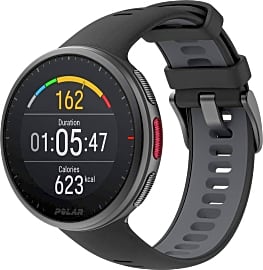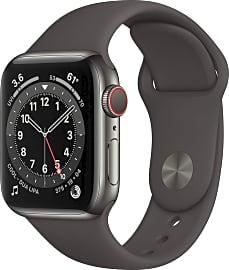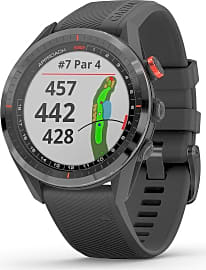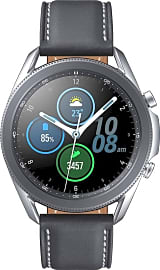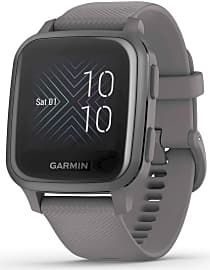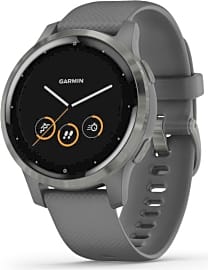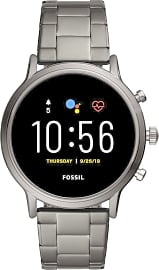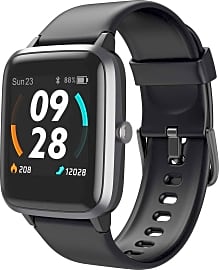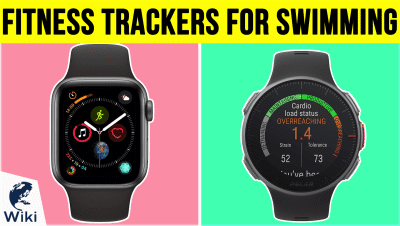The 10 Best GPS Watches

This wiki has been updated 43 times since it was first published in February of 2015. Global positioning systems can come in handy in a variety of situations, whether you want to ensure you can get back to camp safely or you want to know how much farther you have to go on your daily run. These GPS watches are filled with a host of other features, as well, including heart rate monitors, pedometers, and even Bluetooth connectivity, so they can pair with smartphones. When users buy our independently chosen editorial picks, we may earn commissions to help fund the Wiki.
Editor's Notes
December 14, 2020:
Many of the big companies in this sector continue to evolve their offerings, with models like the Fitbit Versa 3 Health & Fitness delivering enough storage space for a good run's worth of music and the ability to pair with Bluetooth headphones. And the Polar Vantage V2 has improved its on-wrist heart-rate monitoring, even though the watch is still available with a chest strap monitor, which, as is always the case, is going to be more accurate.
One of the particularly interesting newcomers to this ranking is the Garmin Approach S62, which is designed to use global positioning to locate you on a given golf course and give you advice as to which club would most likely reach the pin or get you out of a hazard. What'a amazing about this model is that it actually comes with a bunch of courses pre-loaded — over 41,000 in fact.
And while many of these offerings are fitness trackers first and smartwatches second, we still included two of the heavy hitters in the smartwatch sector with the Apple Watch Series 6 and the Samsung Galaxy Watch 3. The Samsung model undeniably wants to seem more like a regular watch at first glance, with a round case design and contrast-stitched leather strap. So, if you want your timepiece to scream smartwatch, you might do better with the Apple model.
December 10, 2019:
Because GPS watches can be used for a huge range of purposes, from keeping you safe on a hike to acting as a fitness tracker for swimming, we've kept a wide variety to suit all needs. And while we've updated this list to reflect the newest versions of some tried-and-true favorites, we've also kept a few older versions for those who may not have the budget to splurge on expensive new releases.
When it comes to hot new watches, it's currently tough to top the Garmin Fenix 6X Sapphire. It adds Galileo satellite tracking to the older Fenix 5X's GPS and GLONASS capabilities, and also provides a display that is over 30 percent larger than that found on previous models. We've also added the Apple Series 5 and the Samsung Galaxy Active2, feature-packed choices that work as fitness trackers and more. Note that both do work with iOS, but the latter works much more smoothly with a Samsung phone.
On the budget-friendly side, we've added the Garmin Forerunner 35 over the Garmin Forerunner 920XT. The latter isn't necessarily a bad model, but there are equally robust models at slightly lower price points, including the sleek Coros Apex. The Forerunner 35, on the other hand, is tough to beat for the price, especially considering its clear display and water resistance to 5 ATM.
Special Honors
Lil Tracker LT-1100 You can keep tabs on your little ones (and have them be grateful for it) with the Lil Tracker LT-200. They'll love the fun design, and you'll love the peace of mind that comes with knowing they're safe — and knowing you can listen to what's going on around them thanks to a set of sensitive microphones. liltracker.com
Garmin Marq Athletes who don't have the Garmin Marq strapped to their wrists are missing out on a treasure trove of information, including distance traveled, speed, calories burned, and more. It's available in a wide variety of styles that resemble high-end chronographs, and each model is geared toward a particular need, like golfing, driving, or athletics. garmin.com
GPS Watch Versus A Smart Phone
Taking a smartphone along for swimming laps is an impossibility, but not only can many GPS watches be worn when swimming, some even count strokes and laps.
With the prevalence of smartphones, some may think there is no need for a GPS watch, but they actually offer many benefits over using a smartphone for fitness tracking. The four biggest benefits are accuracy, battery life, durability, and size.
It's no secret that fitness tracking apps on smartphones are often wildly inaccurate. A recent study by the University of Toronto concluded that smartphone fitness tracking apps are "neither valid nor consistent in measuring step counts". This is because many of the sensors in smartphones are substandard when compared to dedicated fitness tracking devices.
Most smartphone users struggle with battery life when just performing daily activities, like making phone calls, and browsing the web. Battery life is even more of an issue when using GPS fitness apps. So unless one has the time to recharge the phone for a couple of hours after exercising, they might be left with a dead phone for the rest of the day.
When it comes to durability and size, GPS watches are the hands down winner. Getting caught in the rain while running with a smartphone can be disastrous, but many GPS watches are waterproof, and nearly all are water resistant. Taking a smartphone along for swimming laps is an impossibility, but not only can many GPS watches be worn when swimming, some even count strokes and laps. For those who find the large size of a smartphone inconvenient to carry when running, a GPS watch offers a compact solution.
Choosing The Right GPS Watch
The most common uses for GPS watches are running and hiking, but many people also find them beneficial for swimming, skiing, kayaking, and cycling. One who intends to use their watch for running has different needs than one who will be taking their GPS watch swimming and kayaking. If you are on the fence about what you will be using your watch for the most, it is best to buy one that has more features than you think you need, to cover all of your bases.
Different watches also offer varying levels of data tracking capabilities.
For those who want to take their watch on extreme excursions and water-based adventures, it is important to look for one with a durable and waterproof case. There are some models designed specifically with triathlons in mind that can can switch quickly from one sport to another.
Battery life for GPS watches runs the gamut. The more features and sensors it has, the shorter the battery life generally is, but there are some very high end models packed with features that still get an impressive battery life. One should also take into account the screen size. Some may find that a smaller watch is more comfortable when running, but others may find the small screen inconvenient when trying to read exercise data.
Different watches also offer varying levels of data tracking capabilities. Some may only track speed and distance, while others track heart rate, elevation, calories, vertical speed, temperature, and more. The more data tracking features you get, the more you pay, so determine which features are most vital to you. For somebody who often runs indoors, a built-in accelerometer and indoor run option are necessary, while outdoor runners may find them extraneous. Swimmers will want a GPS watch that counts swim strokes and laps.
Take the time to closely examine all of the additional features of the watch you are considering and compare it with other options. Some offer onscreen maps, beep or vibration alerts, programmable interval workouts, off-the-shelf training programs, and feedback on running form.
History Of GPS
GPS is a network of satellites that orbit the Earth and are capable of sending and receiving signals to and from anyone with a GPS device, no matter where on Earth they are located. It was initially created with military applications in mind, but has since been opened up to consumer use.
The United States was motivated to create the GPS during the Cold War after the Soviet Union launched Sputnik in 1957.
The United States was motivated to create the GPS during the Cold War after the Soviet Union launched Sputnik in 1957. After Sputnik was launched, the United States set their mind to launching their own satellite, and by 1960 they launched Transit, a five satellite system that allowed U.S. Navy ships to take a reading on their position once every hour.
A decade later, the Timation satellite system was launched to replace Transit. Timation satellites had more accurate atomic clocks, which made them able to accurately determine a GPS receiver's location on Earth. In the seven years between 1978 and 1985, 11 new satellites were launched into the Timation system.
Under the Reagan Administration, the United States decided to open the GPS system up to commercial and consumer use after the Soviet Union shot down a Korean passenger jet who strayed too close to their borders. Until then, commercial flights had no way of accurately determining their exact location.



